|
|
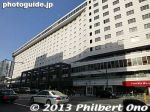
Tokyu Hotel in Akasaka.
|
|
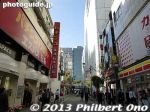
Akasaka
|
|
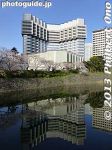
The shrinking hotel. Akasaka Prince Hotel in Tokyo was being demolished from top to bottom. It used to be 39 stories high. Now it's about 10-15 stories in March 2013.
|
|

It's an enclosed demolition system starting at the top. They've kept the building's roof intact while being supported by temporary pillars using hydraulic jacks.Before they started, they first installed cranes and a suspended canopy (seen here) that slides down. This system reduces dust and noise, makes it safer for workers, doesn't affect surrounding buildings, and generates electricity with the crane lowering debris.
|
|
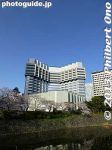
As the top floor is gutted and debris removed by cranes inside the building, they lower the roof, thereby shrinking the building.
|
|
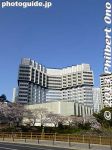
The demolition started in June 2012 and was completed in May 2013. Built in 1982, the Akasaka Prince Hotel is Japan's tallest building ever to be demolished.
|
|
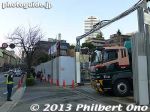
Trucks leave the demolition site.
|
|

The New Otani Hotel opened in Sept. 1964. It became an iconic building in Tokyo even since it appeared in the James Bond movie "You Only Live Twice." This area was also where prominent daimyo had their Edo residences.
|
|
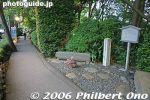
The Ii Clan from Hikone, Shiga (Omi Province) had their residence here near The New Otani.
|
|
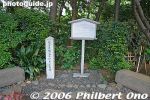
The Ii Clan from Hikone, Shiga (Omi Province) had their residence here near The New Otani.
|
|

About the Ii Clan's residence here near The New Otani.
|
|
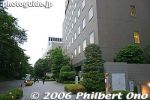
Site of the Owari Clan's residence in Edo.
|
|

Site of the Owari Clan's residence in Edo.
|
|

National Diet of Japan 国会議事堂
|
|

The National Diet building (Kokkai Gijido in Japanese) was built in Nov. 1936 after 17 years of construction. 国会議事堂
|
|

The Central Tower is 9 stories high. Below it is the Central Entrance whose bronze doors are opened only for the Emperor of Japan, State Guests, and new Diet members on the first day of a Diet session.
|
|

The building is perfectly symmetrical on the left and right. On the left is the House of Representatives (Shugiin). 衆議院
|
|

On the right is the House of Councillors (Sangi-in). 参議院
|
|

Side view of the House of Councillors (Sangi-in).
|
|

The National Diet is Japan's political and legislative center. The capital of Japan. Free 60-min. tours (in Japanese only) are conducted every hour every day when the Diet is not in session.You can see the House of Councillors (Sangiin), the central tower, and the Emperor's Room.
|
|

Central Tower
|
|

Guarded entrance to National Diet
|
|

Inside the Central Tower. Stained glass and murals depicting the four seasons.
|
|

The free tour starts by going down to the House of Councillors Visitors' Lobby.
|
|

House of Councillors Visitors' Lobby. Various exhibits are here. 参観ロビー
|
|

Sample of various stones used in the building. As much as possible, domestic materials were used in the construction.
|
|

Ballot box and ballot slips. 投票箱・木札
|
|

Throne used by the Emperor in the National Diet during the Meiji Period. 御椅子
|
|

Signboard for nobles
|
|

Diet pins. Photography is not allowed inside the building outside this lobby.
|
|
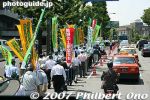
The National Diet also sometimes sees demonstrators or protestors.
|
|
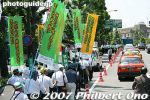
They look like farmers complaining about increasing food imports to Japan.
|
|
|
|
|

Tokyo Millenario was a brilliant sculpture of light mounted over a street in Marunouchi near Tokyo Station. From 1999 to 2005, it was held during the last week of the year until New Year's Day. The event was discontinued after 2005 due to constructioTokyo Millenario was mounted over a small street in Marunouchi called Marunouchi Naka-dori during the last week of the year. It lit up from 5:30 pm to 9 pm and on Jan. 1 (the last day), from midnight to 3 am. It became a major winter attraction, with over 2 million visitors in 2004.
The crowds were horrendous. It took 40 min. or longer just to get in. Photo: 5:05 pm: At the back of the line.
|
|

5:16 pm: Our line merges with another one coming from Tokyo Station
|
|

Behind us
|
|

"Red light ahead, please stop..."
|
|

5:34 pm: Entrance in sight
|
|

Title of work: "Corolle Liberty" by Valerio FestiThe artist is Italian.
|
|

Entrance. The entrance gate is 22 meters tall and 19 meters wide.
|
|
|
|

5:40 pm: Entered Tokyo Millenario street
|
|
|
|
|

Back of entrance
|
|
|

"No stopping please..."
|
|

Less crowded at the end. After you pass through the main street, there are more decorations on the side street. You can also backtrack on the main street along the sidewalk only.So if you want to see the Millenario really quickly and don't mind not being in the middle of the street, go on the sidewalk.
|
|
|
|

"Quadrifogli " (Clovers of Light) at Tokyo Station
|
|

Tokyo Station
|
|
|
|
|
|